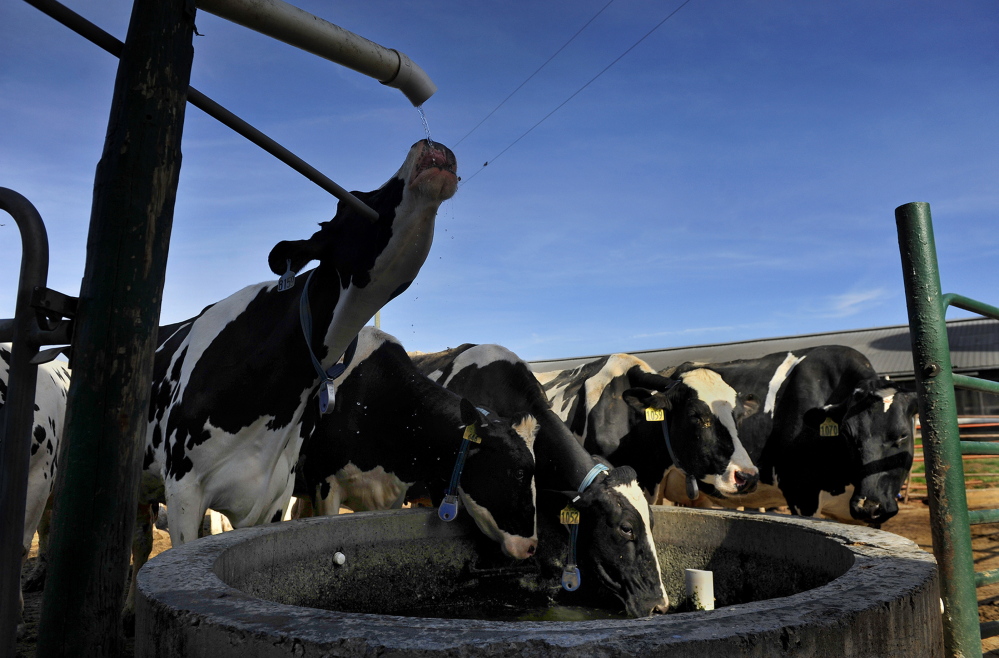Randy Sowers always expected the government to show up one day and ask where all the cash he was depositing at his bank came from. He thought he had the right answer: from his business selling eggs and milk at farmers markets.
But under a federal law designed to target money laundering, Sowers and his Maryland dairy farm lost a big chunk of that income – $29,500 – to the government. Three years later, he hasn’t gotten any of it back and almost certainly never will. In the court of public opinion, however, South Mountain Creamery has become a potent symbol for the movement against civil asset forfeiture.
Sowers’ case is perfect for libertarians trying to stir up opposition to government seizures of cash. It appeals to conservatives, liberals and anyone who likes baby cows.
Sowers is a high-school-educated entrepreneur who describes himself as inspired by God to deliver local dairy products to busy locavores. The chickens he and his wife, Karen, raise are cage-free, their cows grass-fed, their milk pumped into glass jugs. Nestled in the farmland of Frederick County, Md., South Mountain has fans in both Washington and Baltimore.
On the other side is the seemingly perfect villain for forfeiture critics. Assistant U.S. Attorney Stefan Cassella, who handled the case, helped draft Justice Department asset-forfeiture policy and launched an entire forfeiture unit in Maryland. Cassella quite literally wrote the book on goverment seizures: “Asset Forfeiture Law in the United States, 2nd Edition.”
Sowers was not accused of money laundering or attempting to hide illegal profits. Federal agents who showed up at his farm in February 2012 told him that they thought he was an honest businessman. But he had run afoul of federal law requiring banks to report deposits of more than $10,000 and making it a crime to evade the reporting requirement by “structuring” cash into smaller amounts.
The law is aimed at fighting money laundering, terrorism financing, tax evasion and other fraud, and its use against small businesses has become a target for critics of government overreach.
‘CAPTURED THE IMAGINATION’
“The South Mountain case happened to be one of these that captured the imagination,” said Walter Olson, a blogger for the libertarian Cato Institute who has written about the Sowers case.
Unlike many business owners accused of financial crimes, Sowers was also willing to talk. He told anyone at the farmers markets who asked how he was doing. He told the state secretary of agriculture.
The story he’s now told to members of Congress, Christian broadcasters and Chinese-language television begins in 2011, when South Mountain’s weekend farmers market business started to take off.
“We wanted to put the money somewhere my employees wouldn’t see it and think we had a lot of money to spend,” Sowers said. So his wife started putting the farmers market cash in a new account. A teller told her, Sowers said, that depositing more than $10,000 at once would require the filling out of a form. So the Sowerses kept their deposits below that amount, even when a weekend could yield $12,000 to $14,000 in cash.
On Feb. 29, 2012, two special agents showed up at the farm and asked Sowers about the deposits. He told them, according to court filings, that he was trying not to “throw up red flags.” In other words, he admitted that he had intentionally avoided triggering the disclosure requirement.
“That’s about when they quit asking me questions,” Sowers said. The $63,000 in his account had already been seized.
Based on Freedom of Information Act requests, the libertarian Institute for Justice has reported that the Internal Revenue Service has seized almost a quarter-billion dollars in such cases from 2005 to 2012, about half of which was never returned. A third of those cases, like the Sowers case, did not involve allegations of criminal activity beyond the structured deposits themselves.
NEGOTIATION ATTEMPTS FRUITLESS
Sowers’ attorneys, Paul Kamenar and Dave Watt, said attempts to negotiate were fruitless, in part because their client went to the press. Sowers had denied wrongdoing in an interview with Baltimore City Paper. Because of that, as part of a 2012 settlement in which both parties agreed that the government would keep 10 percent of the $295,220 in deposits that were allegedly structured, Cassella required Sowers to agree that there was reason to seize his funds.
Sowers is not that interested in politics. So he was only vaguely aware of the change in Justice Department policy announced March 31. From now on, bank accounts won’t be seized unless serious illegal transactions have been documented.
He also hadn’t heard that Sen. Charles E. Grassley, R-Iowa, is working on legislation to address loopholes in that guidance.
Send questions/comments to the editors.




Success. Please wait for the page to reload. If the page does not reload within 5 seconds, please refresh the page.
Enter your email and password to access comments.
Hi, to comment on stories you must . This profile is in addition to your subscription and website login.
Already have a commenting profile? .
Invalid username/password.
Please check your email to confirm and complete your registration.
Only subscribers are eligible to post comments. Please subscribe or login first for digital access. Here’s why.
Use the form below to reset your password. When you've submitted your account email, we will send an email with a reset code.